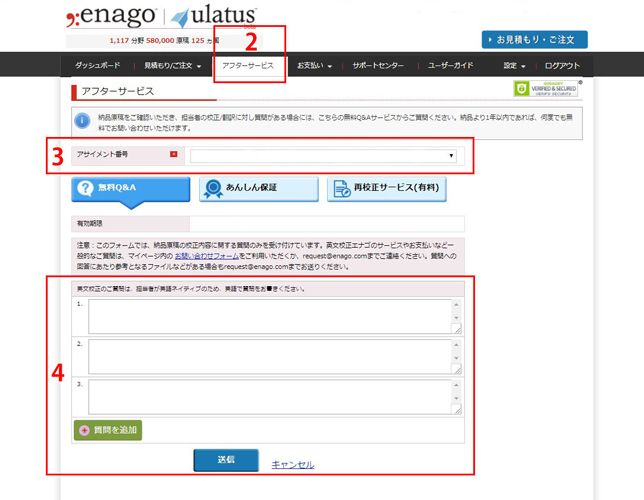担当校正者Q&A
担当校正者Q&Aサービス内容
- 英文校正原稿の納品後、お客様の原稿を担当した英文校正者が、ご質問に無料でお答えします。
- すべての英文校正サービスプランでご利用いただけます。
- ご質問の回数に制限はありません。
- 通常、ご質問には2営業日程度で回答するようにしておりますが、正確な回答日時については、後ほどクライアントサービス部門からお知らせします。
サービスのご利用方法
1. ご自分のマイページにログイン。
2.「アフターサービス」をクリック。
3.「アサイメント番号」欄で該当の案件をクリック。
4.「無料Q&A」のご質問欄に質問を記入し、送信をクリック。

ご利用時の注意点
- 回答するのは英語ネイティブの校正者本人です。ミスのないコミュニケーションのためにも担当校正者へのご質問は英語でお願いします。
- 質問箇所を明確にするため、納品原稿の何ページ目の何行目であるかお知らせください。
質問例 (クリックすると校正者からの回答が見られます)
In line 39, you changed to "The number of cell cultures obtained was more than expected…" But I think "The number of cell cultures were more than expected…" is appropriate. Which is better "was" or "were"?+
Note that a singular/plural verb is used based on whether the subject is singular or plural. Also, when using "the number of," you should use a singular verb. In the mentioned sentence, the subject is "number," which is singular, and the definite article "the" is used. Therefore, "was" is the appropriate verb in this case. Please rest assured that the edit is correct, and we hope that the explanation is satisfactory.
In the 4th line of Material & Method section, "Ethanol solution of 6-MP" was suggested to be changed to "6-MP ethanol solution." Question: I am wondering that sentence should not be started with Arabic numerals+
Thank you clarifying the change. In this case, the numeral 6 in the term "6-MP" does not signify a quantity or a measurement and is a part of the compound name. Hence, the rule about a sentence starting with a numeral does not apply here. For example, a sentence can start with "5-Carboxymethyl…" but not "5 patients were enrolled." Moreover, since the edited term has been used later in the document, you may retain the edit
Thank you for your editing. I have questions about third paragraph. Why do you use the word “parameter”? What differences between the word “parameter” and “categories”?+
Thank you for your questions. We have changed “categories” to “parameters” since each of the three phrases, “the era of the works,” “the genre,” and “the narratives”, are characteristics of art. Multiple categories can be created for any one parameter. For example, if you distinguish works of art based on their genre, they can be categorized into renaissance art, abstract art, postmodern art, etc. Thus, the usage of the word “parameters” here is appropriate.
You said I should mention the limitations of the investigation in the Introduction section But what exactly are you pointing out? limitation has the meaning of "limit", "realm", etc, but what exactly are you pointing out?+
Thank you for your response. Note that journals usually encourage the mention of limitations of the study in the Introduction and Discussion sections. By "limitations," we mean the "obstacles" or "problems" faced during the course of the study, which may have hindered or affected the results in some way, i.e., factors that may affect the outcomes of the study or are important to interpretation of the study findings. The commonest examples are small sample size, volunteer bias, incomplete follow-up, etc. Please consider mentioning these in both the above-mentioned sections only if applicable to your present study.